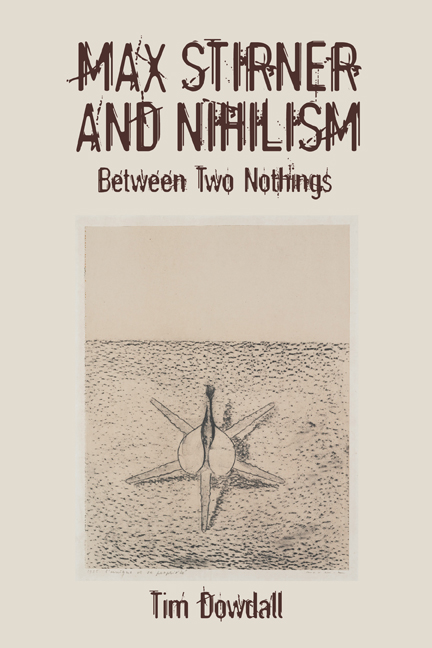Book contents
- Frontmatter
- Dedication
- Contents
- Acknowledgments
- Notes on Sources, Abbreviations, Translations, and Spelling
- Introduction: Stirner: Sinner or Saint?
- Chapter 1 The Origins of Disrepute: Stirner in Context
- Chapter 2 The Meaning of Nothing: Nihilism’s Complex Etymology
- Chapter 3 The Tragic Age for Europe: Nihilism from Nietzsche to Now
- Chapter 4 The Use and Abuse of Nihilism: Stirner under Fire
- Chapter 5 The State of Denial: Stirner and Political Nihilism
- Chapter 6 The Absence of Absolutes: Stirner and Moral Nihilism
- Chapter 7 The Fear of Nothing: Stirner and Existential Nihilism
- Conclusion: Stirner: The Happy Nihilist?
- Bibliography
- Index
Chapter 6 - The Absence of Absolutes: Stirner and Moral Nihilism
Published online by Cambridge University Press: 09 May 2024
- Frontmatter
- Dedication
- Contents
- Acknowledgments
- Notes on Sources, Abbreviations, Translations, and Spelling
- Introduction: Stirner: Sinner or Saint?
- Chapter 1 The Origins of Disrepute: Stirner in Context
- Chapter 2 The Meaning of Nothing: Nihilism’s Complex Etymology
- Chapter 3 The Tragic Age for Europe: Nihilism from Nietzsche to Now
- Chapter 4 The Use and Abuse of Nihilism: Stirner under Fire
- Chapter 5 The State of Denial: Stirner and Political Nihilism
- Chapter 6 The Absence of Absolutes: Stirner and Moral Nihilism
- Chapter 7 The Fear of Nothing: Stirner and Existential Nihilism
- Conclusion: Stirner: The Happy Nihilist?
- Bibliography
- Index
Summary
The Definition of Moral Nihilism
Moral nihilism is defined, simply, as the denial of absolute values and is the type of nihilism which, since the first publication of Der Einzige, has been most frequently used by Stirner's critics to discredit him. Laska goes so far as to view it as the fulcrum of Stirner defamation and demonization: “Whoever labeled Stirner the most extreme, radical, systematic advocate of atheism, immoralism, subjectivism, individualism, egoism, solipsism or the like, meant, even if he did not say so explicitly, that vague concept of ethical nihilism, to which belongs essentially, as already with Jacobi, Hegel, and Rosenkranz, the horror vision of the destructive and apocalyptic, the evil, demonic and satanic.” The justification for the accusation of moral nihilism is to be sought, naturally enough, in Stirner's numerous pronouncements on morality, ethicality, and good and evil (Moral, Sittlichkeit, gut und böse), but before proceeding with their evaluation, it is necessary, once again, to address the familiar issue of terminological ambiguity. Unlike with Russian nihilism, there are no historical figures who readily confess to being moral nihilists, which makes it all the more difficult to identify the term's full range of meanings and connotations.
There is both the implicit and explicit imputation of moral nihilism in much of the censure of Stirner described in chapter 4 above. It is implicit in Bernstein's distinguishing of Stirner's nihilism from Russian nihilism and in Keben's concept of the nihilistic hangover that Stirner's philosophy allegedly engenders. A more recent reference to Stirner's moral decadence (though without mention of the word nihilism), can be found in Helms's Marxist critique of Stirner as a petty-bourgeois proto-fascist. The explicit association of Stirner with ethical nihilism first appeared in Karl Rosenkranz's diary entry concerning the recently published Der Einzige, which included the line: “Theoretically, such nihilism in relation to all ethical pathos cannot develop into anything.” Similar declarations have appeared ever since, as in Laas's description of Stirner's thought as “this nihilistic-Promethean abandonment of all that is moral”; Ströbel's assessment of “Stirner's moral nihilism”; and Schröder's remark about Stirner's “outspoken moral nihilism.”
- Type
- Chapter
- Information
- Max Stirner and NihilismBetween Two Nothings, pp. 154 - 185Publisher: Boydell & BrewerPrint publication year: 2024



